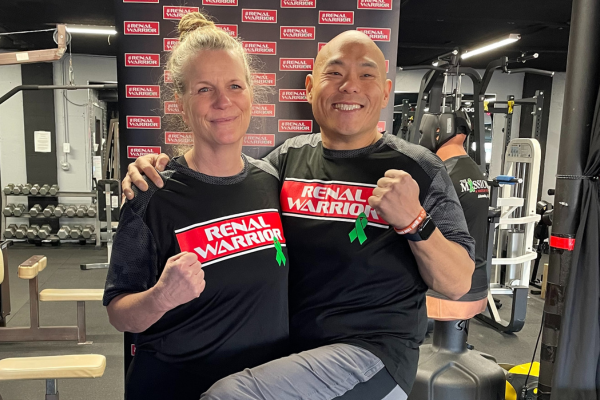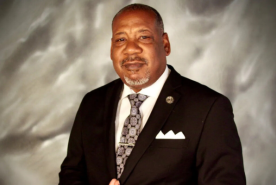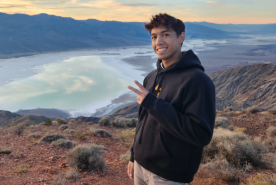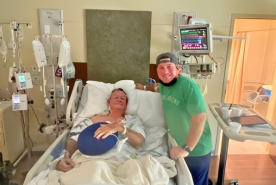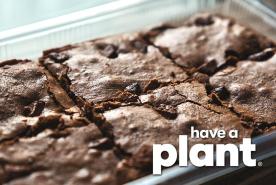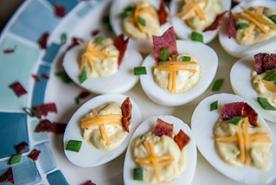April 12, 2023
Have you ever wondered what drives someone to become a living donor? Meet Amy Hewitt, a woman who not only dedicated the last 20 years of her life fighting for patient rights, but also made the selfless decision to donate her kidney to a fellow kidney advocate.
Read on for Amy's journey and discover her mission to inspire others to do the same.
Following her passion to make the world a better place
[VIDEO::http://www.youtube.com/watch?v=v-XsJLcqt-I::aVideoStyle]
Amy started in the nonprofit world twenty years ago while working in the restaurant business. Through her work, Amy met many philanthropically-minded people and one of them asked Amy to lead a foundation for scleroderma, an autoimmune disease.
"We funded research all over the country and worked with really amazing scientists but after ten years dedicated to this mission, I was ready for my next challenge," Amy said. "One of the things that drew me to National Kidney Foundation was the patient connection and engagement."
As the Executive Director of NKF Serving The West, Amy spends most of her time fighting for better kidney health policies, educating the public about kidney health, and raising kidney disease awareness. During one of the many events Amy helped run, she met her future kidney recipient.
See all the ways you can take action and make a difference.
Taking the leap
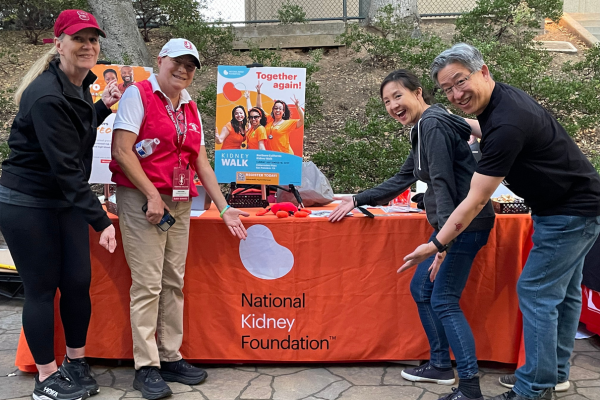
From donating blood to considering donating bone marrow, Amy always sought ways to help. After watching a friend donate a kidney to their mother and seeing both do well, Amy decided to take the leap and become a living donor herself. She brought the idea to her daughter, parents, and friends, who all agreed she should follow her heart and donate.
While Amy could have donated a kidney anonymously, she wanted to donate to someone she knew through her work at NKF: “One of the hardest parts was making the decision about who I would donate to. There were so many people I wanted to help."
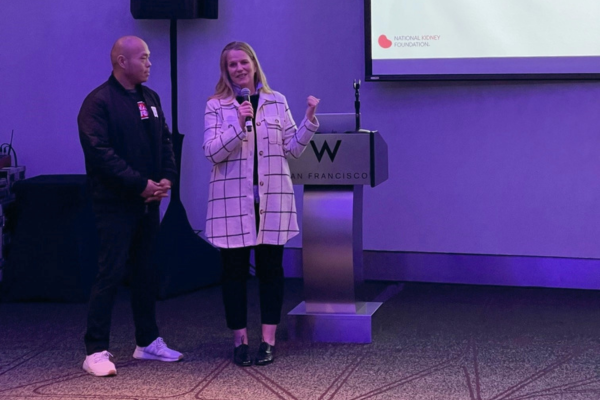
Ultimately, she started the process for Wilson Du, a dedicated kidney advocate who participated in nearly every NKF event Amy organized or attended.
"Whenever we need help or a patient panelist, he's always the first person to raise his hand. We would have a bunch of panelists who had transplants already and he didn't,” Amy said. “It always made me feel so bad. He was so positive but had a few donors fall through and I could see that he was a little disappointed."
Amy started the screening process to become a living donor but didn't tell Wilson until the testing became more intense.
"I didn't say anything to Wilson during that initial screening but I let him know when I was going in for blood work just in case he had another donor lined up. They did all the tests, took a bunch of blood, and scanned my kidneys," Amy said. "I'm a super curious person so I enjoyed watching the process and asking questions. The hardest part was waiting for the results."
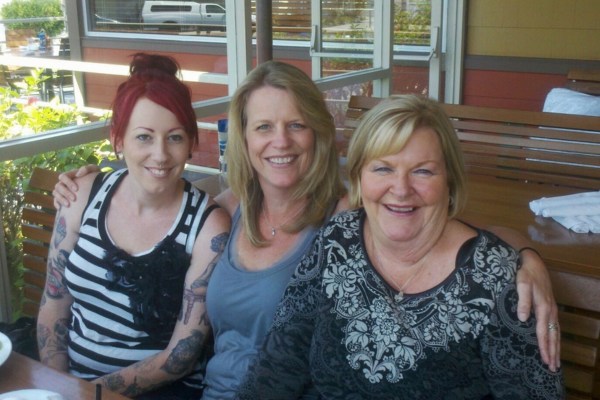
After an agonizing few months, Amy finally received the news she'd been hoping for. She was physically and mentally fit to donate, but she wasn’t a match for Wilson. The transplant coordinator explained they could do a paired kidney exchange, where two living donors switch recipients.
"I got the call from the living donor coordinator letting me know that everything was a go. All the pairs for the paired kidney exchange were ready. I said, 'I'm ready but I'm not the captain of this ship.' I called Wilson who'd gotten the same news and asked what he wanted to do. He said yes. A month later, he had his new kidney, and a week later I went into surgery to donate mine."
Get matched with a peer mentor who knows what it is like to donate a kidney.
Life after donating a kidney
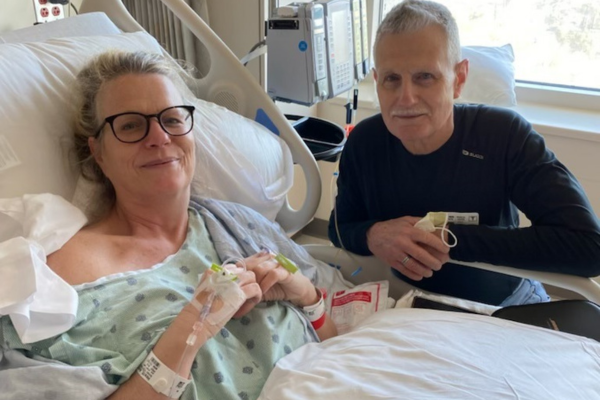
The surgery went smoothly, and Amy returned home within two days. Soon Amy was taking long walks with her father and furniture shopping with her daughter.
"They treat living donors like royalty. I had my own private room and they gave me a machine that goes around my legs to help circulation," Amy said. "I didn't feel much pain at the incision, but during surgery, they pump you full of air. Some air bubbles got caught in my shoulder. That was the most painful part."
The pain from the air bubbles is a normal response to surgery that went away shortly after donating and Amy was even able to speak to her recipient with the help of their transplant coordinator. While this isn’t always an option for altruistic and paired donors, everyone involved in this paired exchange wanted the opportunity to meet.
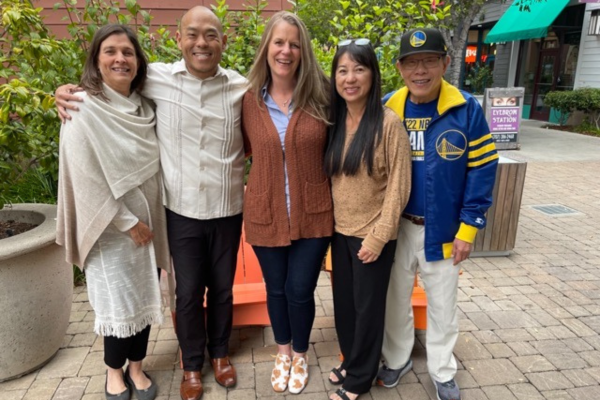
"The discomfort was mild considering the feeling of gratitude I had to be a part of this. I Zoomed with the woman who received my kidney. She's a bit younger with a daughter and has a whole new way to look at life,” Amy said. “She told me her blood pressure is the best it's ever been and other little things I probably would have taken for granted before. I don't feel like a hero. I feel I was gifted with a body and mind that could do this. Not everyone can."
Now, Amy is laser-focused on inspiring others to become living donors. Sign up for the Kidney Learning Center to learn about living donation.
"I think my job now is to really inspire other people to think about it and get creative about how we can get other people thinking about it. If you're considering becoming a donor, take the next step. If you feel like you're not resourced enough, go to kidney.org. Find a mentor and take a look at all the resources," Amy said. "For those who've never considered it, try to think about it. Having a healthy body is an absolute gift that you can share with someone else. There is so much reward in becoming a living donor that many people don't get to experience."
See if you’d qualify for reimbursement of lost wages, travel expenses, and lodging related to your donation through the National Kidney Registry or National Living Donation Assistance Center. And remember, living donors are able to get evaluated at their own pace and can change their minds at any point with confidentiality. You are in control the entire time.
